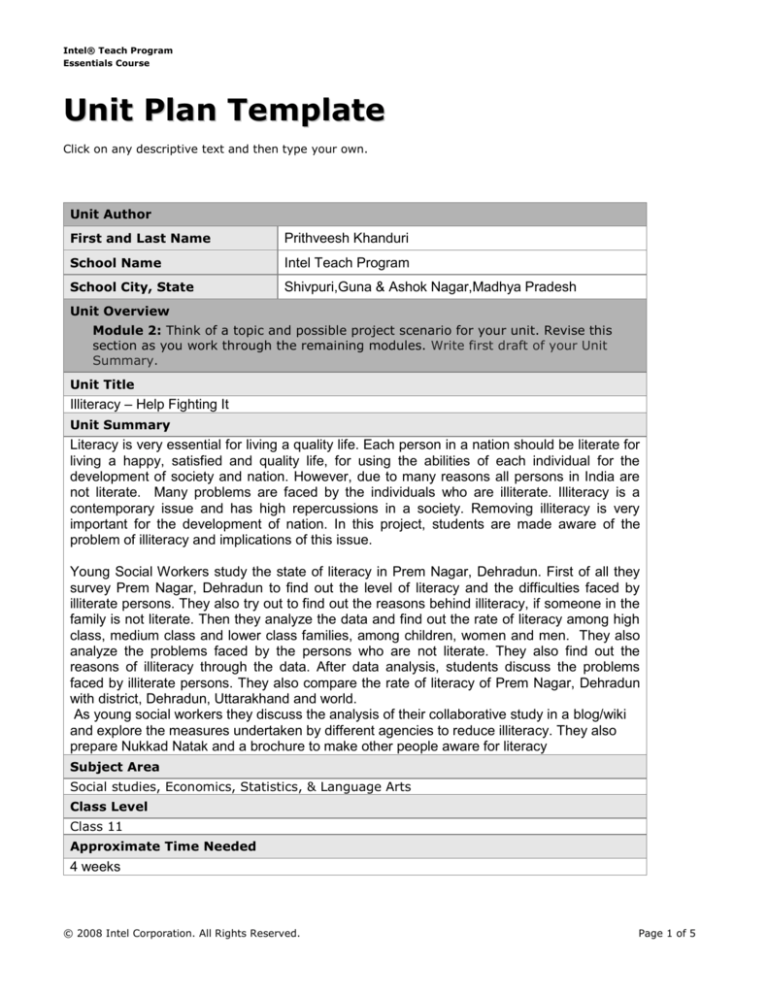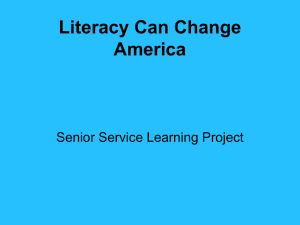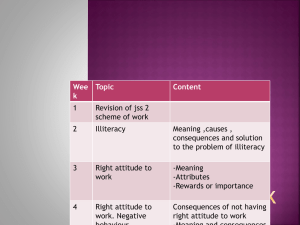
Intel® Teach Program
Essentials Course
Unit Plan Template
Click on any descriptive text and then type your own.
Unit Author
First and Last Name
Prithveesh Khanduri
School Name
Intel Teach Program
School City, State
Shivpuri,Guna & Ashok Nagar,Madhya Pradesh
Unit Overview
Module 2: Think of a topic and possible project scenario for your unit. Revise this
section as you work through the remaining modules. Write first draft of your Unit
Summary.
Unit Title
Illiteracy – Help Fighting It
Unit Summary
Literacy is very essential for living a quality life. Each person in a nation should be literate for
living a happy, satisfied and quality life, for using the abilities of each individual for the
development of society and nation. However, due to many reasons all persons in India are
not literate. Many problems are faced by the individuals who are illiterate. Illiteracy is a
contemporary issue and has high repercussions in a society. Removing illiteracy is very
important for the development of nation. In this project, students are made aware of the
problem of illiteracy and implications of this issue.
Young Social Workers study the state of literacy in Prem Nagar, Dehradun. First of all they
survey Prem Nagar, Dehradun to find out the level of literacy and the difficulties faced by
illiterate persons. They also try out to find out the reasons behind illiteracy, if someone in the
family is not literate. Then they analyze the data and find out the rate of literacy among high
class, medium class and lower class families, among children, women and men. They also
analyze the problems faced by the persons who are not literate. They also find out the
reasons of illiteracy through the data. After data analysis, students discuss the problems
faced by illiterate persons. They also compare the rate of literacy of Prem Nagar, Dehradun
with district, Dehradun, Uttarakhand and world.
As young social workers they discuss the analysis of their collaborative study in a blog/wiki
and explore the measures undertaken by different agencies to reduce illiteracy. They also
prepare Nukkad Natak and a brochure to make other people aware for literacy
Subject Area
Social studies, Economics, Statistics, & Language Arts
Class Level
Class 11
Approximate Time Needed
4 weeks
© 2008 Intel Corporation. All Rights Reserved.
Page 1 of 5
Intel® Teach Program
Essentials Course
Unit Foundation
o Module 2: Choose 21st century skills, higher-order thinking skills, syllabus
guidelines, unit topic, create objectives, and develop Curriculum-Framing
Questions for your unit. Revise this section as you work through the remaining
modules.
Targeted Syllabus Guidelines
Uttarakhand .Board
Targeted 21st Century and Higher Order Thinking Skills
Communication Skills
Collaboration Skills
Problem Solving Skills
Innovation
Student Objectives/Learning Outcomes
Students
Students:
Define illiteracy.
find out the status of literacy in Prem Nagar, Dehradun
Find out the causes of illiteracy.
Understand and explain the effect of illiteracy.
Compare the rate of literacy of Prem Nagar, with Dehradun, Uttarakhand, India and
world.
Suggest some measures to reduce illiteracy.
Student PowerPoint presentation objectives
To observe and collect data on the rate of literacy of Prem Nagar .
Students analyze data and synthesize it with other information.
Students analyze causes of the illiteracy.
Students suggest ways to reduce illiteracy.
Student Publication objectives.
Students learn about the literacy.
Students survey the rate of literacy in Prem Nagar
Students compare the rate of literacy of Prem Nagar with rate of literacy of Dehradun,
Uttarakhand, India and world.
Student Website objectives
Students learn about plans of the Government in dealing with this issue.
Students learn about the functions and plans of CMWSS.
Students discuss about the findings of their collaborative study.
Students propose a plan of action for reducing illiteracy.
Students invite others to join in their efforts to reduce illiteracy.
Curriculum-Framing Questions
Essential Question
Unit Questions
How can I make a difference?
What can we do to solve the problem of illiteracy?
© 2000-2007 Intel Corporation. All Rights Reserved.
Page 2 of 5
Intel® Teach Program
Essentials Course
What is the status of litteracy among people of
Nagar Nagar, Dehradun?
Prem
What are the causes of illiteracy among people?
Why are people illiterate?
What are the effects of the illiteracy?
Content Questions
Compare the rate of lliteracy of Prem Nagar to the rate of
literacy of Dehradun?
What is the difference between the rate of literacy of Prem
Nagar and Uttarakhand?
What is the difference between the rate of literacy of Prem
Nagar and India?
Find out the reasons of difference in the rate of literacy
among Prem Nagar, Dehradun, Uttarakhand and India?
What measures may be taken to remove illiteracy?
Assessment Plan
Module 3: Draft an Assessment Timeline.
Module 6: Draft an Assessment Summary and create an assessment to gauge
student needs. Create an assessment for your student sample.
o Module 7: Create an assessment to foster student self-direction and update your
Assessment Plan.
Assessment Timeline
o
o
Before project work
Students work on projects
After project work is
begins
and complete tasks
completed
Questioning
Quiz
KWL
Observation
Checklist
Presentation
Rubric
Presentation
Rubric
Show Casing
Publication
rubric
Web Site Rubric
Questioning
Group
Discussions
Assessment Summary
Group Research activity: assessment as per scoring rubric
Group activity for gifted students: assessment as per scoring rubric
© 2000-2007 Intel Corporation. All Rights Reserved.
Page 3 of 5
Intel® Teach Program
Essentials Course
Assignment for resource students: assessment as per scoring rubric
Evaluation for student multimedia presentation, newsletter and website as per rubrics
Unit Details
Prerequisite Skills
Conceptual Knowledge
Knowledge of Population.
Technological Skills
Basic use of computers.
Creating power point presentation.
Browsing the internet.
Instructional Procedures
o Module 5: Create a student sample and draft Instructional Procedures.
Update Instructional Procedures to include:
o Module 6: Assessment methods used throughout unit
o Module 7: Differentiation strategies
o Module 8: Facilitation and implementation strategies
Plan outline:
Begin the lesson in the classroom with the essential question ‘H
How can I make a
difference?’ students are instructed to prepare an interview/ questionnaire exploring
the rate of literacy in Prem Nagar, Dehradun, and Uttarakhand.
Step 1 -Project Introduction
The topic of project is discussed with the students. The teacher explains the
assignments in detail and shares the evaluation rubrics of the different assignments with
the students. This helps the students to understand what is expected of them and the
students are shown how to use it to guide their work.
The whole class if divided in 6 groups. Every group prepares a questionnaire or
questions for interview.
To begin with, students work on a research exercise using the research guide which
helps them to understand about the literacy.
The Students playing the role of social worker conduct the survey in Prem Nagar to find
out the rate of literacy. They analyzed the data. They compare the rate of literacy of
Prem Nagar with Dehradun, Uttarakhand, India and world. They prepare graphical
presentations of the rate of literacy. Then they prepare a Nukkad Natak for awareness
about literacy among illiterate persons. Students also prepare a brochure make literate
persons and make a website to share their experiences.
Accommodations for Differentiated Instruction
o Module 7: Draft ideas to support all learners and create student support material.
© 2000-2007 Intel Corporation. All Rights Reserved.
Page 4 of 5
Intel® Teach Program
Essentials Course
Give Extra Time.
Get Specialist Guidance and Support.
Special Needs
Student
Gifted/Talented
Student
The students help in the enhancement of the presentation and the
The students will interview the residents of Prem Nagar
accompanied in a group along with the gifted students. The gifted
students will supervise them in this task.
They have to also undertake a special quiz created for them.
They will help in analysis of the data. Collection of the information
from the internet.
The students will maintain contact with the students of other school
through e-mail and will keep the track of their progress and data.
Guiding the presentation after analysis of the data.
Guiding the resource students in all groups.
Undertaking a special assignment on literary.
Materials and Resources Required for Unit
o
Module 4: Identify Internet resources for research, communication, collaboration,
and problem solving.
o
Module 5: Incorporate into your Instructional Procedures.
Technology—Hardware (Click boxes of all equipment needed)
Camera
Laser Disk
VCR
Computer(s)
Printer
Video Camera
Digital Camera b
Projection System
Video Conferencing Equip.
DVD Player
Scanner
Other
Internet Connection
Television
Technology—Software (Click boxes of all software needed.)
Database/Spreadsheet
Image Processing
Web Page Development
Desktop Publishing
Internet Web Browser
Word Processing
E-mail Software
Multimedia
Other
Encyclopedia on CD-ROM
Printed Materials
Supplies
Books from college Library, Newspapers, Magazines, Handouts
MS Encarta , Charts, Globe,etc
Internet Resources
WWW.Google.Com
http:// Blogspot.com
http://Engage.intel.com
Other Resources
Field trip to Prem Nagar, Dehradun, Uttarakhand.
Interview with residents of Prem Nagar.
Online collaboration with students of college
Programs of the Intel® Education Initiative are funded by the Intel Foundation and Intel Corporation.
Copyright © 2007, Intel Corporation. All rights reserved. Intel, the Intel logo, Intel Education Initiative, and Intel Teach Program are
trademarks of Intel Corporation in the U.S. and other countries. *Other names and brands may be claimed as the property of others.
© 2000-2007 Intel Corporation. All Rights Reserved.
Page 5 of 5








